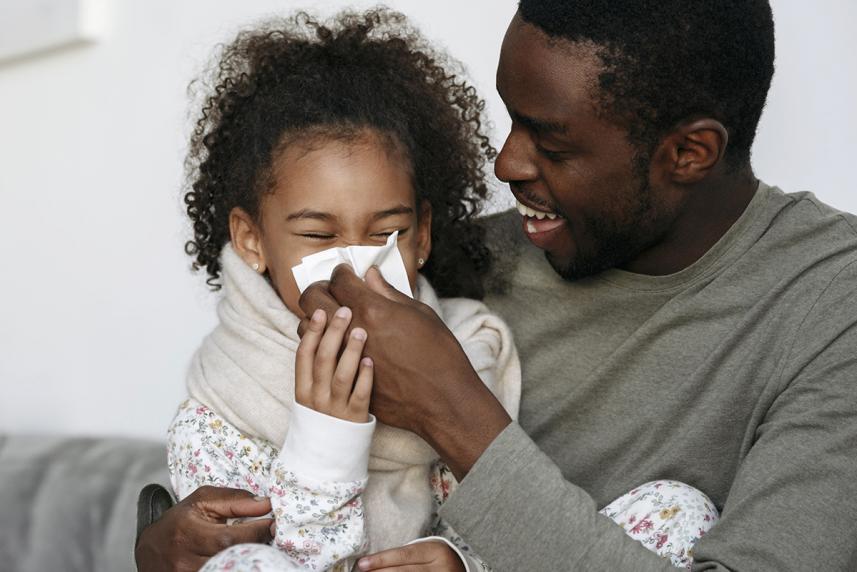
We have more than 60,000 doctors at over 2,000 locations. Our team will help you get the care you need, when and where you need it.

Be prepared for cold and flu season. Here are the medications and other supplies to have on hand this winter in case you get sick.
For many households, winter means prime cold and flu season. Get prepped by creating a winter sick-day survival kit for your family. Stock up now and you’ll be ready to handle congestion, scratchy throats and fevers. Plus, you’ll save yourself the pharmacy trip when it’s cold outside.
Here are the expert-approved essentials you should have on hand to help you and your family feel better fast.
Keep your cabinet stocked with these sick-day basics for adults, suggests Samuel Mathis, MD. He is a family physician at the University of Texas Medical Branch in Galveston, Texas.
Pain relievers. Over-the-counter (OTC) pain relievers such as acetaminophen (Tylenol®) and ibuprofen (Advil®, Motrin®) can help ease symptoms, including:
Allergy medicine. Sometimes it can be hard to tell the difference between seasonal allergies and a cold. Most winter allergies are triggered by indoor allergens such as dust mites, mold or pet dander. So it can’t hurt to keep products such as nasal steroid spray (Flonase®, Nasonex®) and an antihistamine (Zyrtec®, Benadryl®) handy.
Be careful with products that contain the decongestant pseudoephedrine (such as Claritin-D®, Allegra-D®). Pseudoephedrine can raise blood pressure, Dr. Mathis says. In fact, if you have high blood pressure, you may want to avoid OTC decongestants altogether, according to the Mayo Clinic. Talk to your doctor about which allergy medications are best for you.
Cough medication. Cough suppressants help quiet a cough. Expectorants loosen extra mucus (phlegm) in your airways so that you can cough it up. Medicines such as cough syrup and cough drops can also help soothe a sore throat.
Saline nasal spray. Saline nasal sprays contain a mixture of salt and water. They help wash extra mucus, germs and allergens from the sinuses and nose. “Saline nasal spray can be far more effective at treating congestion because it’s working with your body’s passive immune system,” says Samuel Werner, DO. He’s an osteopathic physician in West Hartford, Connecticut.
He often prefers saline sprays over OTC decongestants, since the sprays can shorten the duration of an illness. Decongestants only temporarily treat symptoms and have an added risk of side effects.
Facial tissues. Soft, absorbent facial tissues are a must-have for runny noses. You should always have an extra box or two, says Dr. Mathis.
Petroleum jelly. Is the skin around your nose irritated from all that blowing? Petroleum jelly works wonders at soothing raw, cracked winter skin.
Thermometer. Be sure you have a working thermometer for checking temperatures. (Should you call a doctor if you have a fever? Learn more here.)
Humidifier. This is a device that releases steam to raise indoor moisture levels. “Humidifiers can be helpful for runny noses, allergies, asthma or dry throats,” Dr. Mathis says. Adding moisture to the air helps open up your sinuses and soothe a sore throat. Try running one in your bedroom at night to help you sleep.
COVID-19 home tests. A runny nose and sore throat can also be signs of a COVID-19 infection. Have some rapid tests at the ready so you can be sure.
The Optum Store sells a broad range of cold and flu medications. And you can order them from the comfort of your couch.
If you have little ones at home, be sure to add these supplies to your sick-day survival kit.
Children’s pain reliever. Pick up the children’s version of go-to pain relievers such as acetaminophen and ibuprofen. “These medications are weight-based, so make sure to check the dosage before giving them,” Dr. Mathis says.
Children’s cough medicine. You should also pick up a children’s cough and cold medicine. But don’t give cough medicines to kids under 6 years old without checking with their pediatrician first, says the Cleveland Clinic.
Menthol vapor rub. Dr. Mathis recommends keeping this topical medicine on hand to clear the sinuses. Simply rub a little bit on your child’s chest and throat.
Bulb syringe. Babies don’t know how to blow their nose, so they’ll need help. If you have an infant with a stuffy nose, use a bulb syringe to suction mucus from their mouth or nose. You can thin the mucus first by giving them saline nose drops.
Rectal thermometer. This is the most accurate way to check the temperature of children younger than 4 years old.

We have more than 60,000 doctors at over 2,000 locations. Our team will help you get the care you need, when and where you need it.
Natural remedies can bring cold relief, too. But you should always check with your doctor before adding herbs or supplements to your routine. This is especially important if you’re taking other medications or are being treated for a health condition, adds Dr. Mathis.
Also, never give supplements to a child without talking to the doctor first. Here are a few products to consider adding to your kit:
Vitamin C. Studies on the effectiveness of vitamin C for fighting colds and flu go back and forth. “But I would say it’s often worth taking the recommended dosage on the label because it’s inexpensive and safe for most people,” Dr. Werner says.
Zinc. Feeling achy or getting a slight cough? Zinc lozenges may be helpful to take when you first notice symptoms. They can shorten the duration of a cold, says the National Center for Complementary and Integrative Health (NCCIH).
Echinacea. This herbal supplement may boost your immune response when you get sick. And that helps your body fight off infection, according to the NCCIH. It’s available in tablets, capsules and even teas.
If you’re feeling cold or flu symptoms, call your doctor. Or make a virtual appointment and skip the crowded waiting room.
We’re here to help you stay as healthy as possible — and recover as quickly as you can — all season long. Check out our winter wellness guide now.
Additional sources
Decongestants and high blood pressure: Mayo Clinic
Children’s cough medicine: Cleveland Clinic
Zinc: National Center for Complementary and Integrative Health
Echinacea: National Center for Complementary and Integrative Health